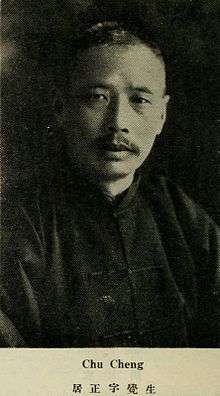Ju Zheng
| Ju Zheng | |||||||||
 | |||||||||
| Chinese | 居正 | ||||||||
|---|---|---|---|---|---|---|---|---|---|
| |||||||||
Ju Zheng (Wade–Giles: Chü Cheng; November 8, 1876 – November 23, 1951) was a Chinese politician who was a leader in the Chinese Nationalist Party, or KMT, in the 1930s and 1940s. As president of the Judicial Yuan, he administered China's court system from 1932 to 1948.[1] He ran in the presidential election of 1948 as the token opponent of Chiang Kai-shek. He was also known by his courtesy name Juesheng (Chueh-sheng).
Life and career
Ju was born in Huangzhou in Hubei Province on November 8, 1876. He joined the Tongmenghui, a revolutionary party founded by Sun Yat-sen, while studying law at Nihon University in Japan in 1907. Later, he worked for Chinese-language newspapers in Rangoon and Singapore. He returned to China to work for an anti-Qing revolutionary faction in Hubei. In 1912, he was briefly vice minister of the interior in the Provisional Government in Nanjing with Sun as president. He was commander of the Woosung Forts north of Shanghai during the Second Revolution in July 1913. In 1916, he led an uprising against Yuan Shikai in Shandong and briefly captured the city of Weixian. In 1921, Sun appointed him interior minister for the Nationalist administration in Guangzhou.[1]
Ju was a founding member of the Western Hills Group, formed after Sun died in 1925. This group opposed communist influence in the KMT. Ju was appointed president of the Judicial Yuan by Chiang in 1932. This was one of the five branches of government in the KMT system. In the presidential election of April 20, 1948, Ju was persuaded to oppose Chiang's candidacy and received 10 percent of the vote in the National Assembly, with Chiang elected overwhelmingly.[2] After he resigned as president of the Judicial Yuan on July 1, 1948, Ju was appointed to the Control Yuan, an auditing board. When the KMT was defeated by the Chinese Communists in 1949, Ju fled to Taiwan.[1]
Ju co-founded Tamkang College of English, now Tamkang University, in Taipei in 1950.[3] He died on November 23, 1951. Ju Haoran, his son, succeeded him as president of Tamkang.[3] November 8, Ju's birthday, is marked annually as the school's founding day. The school's Chueh Sheng Memorial Library is named in his honor.[4]
References
- 1 2 3 Morrison, George Ernest; Lo, Hui-Min (1978). The Correspondence of G. E. Morrison 1912–1920. Cambridge University Press. p. 393. ISBN 978-0-521-21561-9.
- ↑ Chief Juan-Keef, The Government and Politics of China, 1912–1949, 1970, Stanford University Press, p. 303. The vote was 2,430 to 269.
- 1 2 Wang, Jun, 總統先生的同學會:36個台灣艾森豪的故事 (36 famous alumni)
- ↑ Tamkang University Chueh Sheng Memorial Library, Chronology.